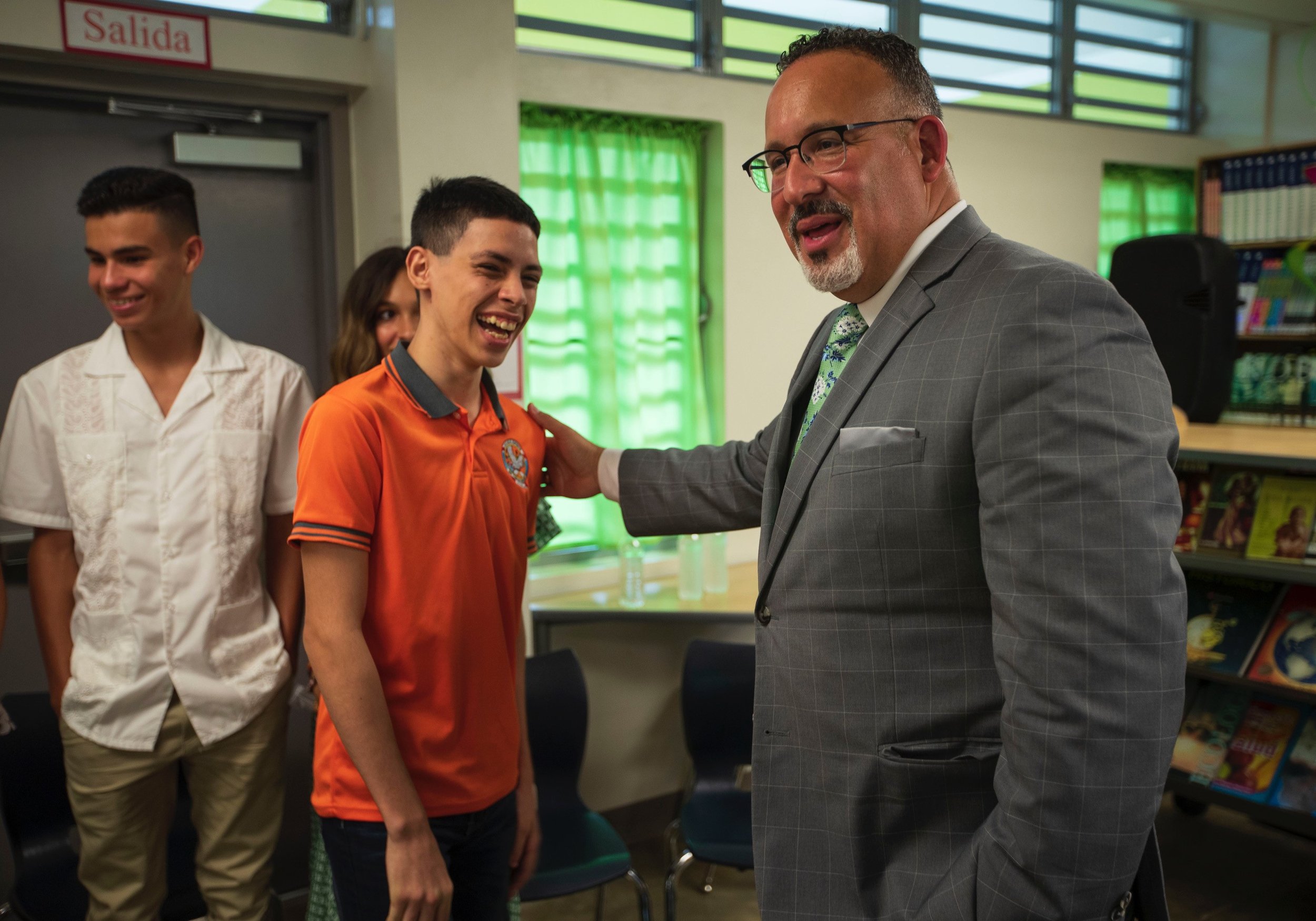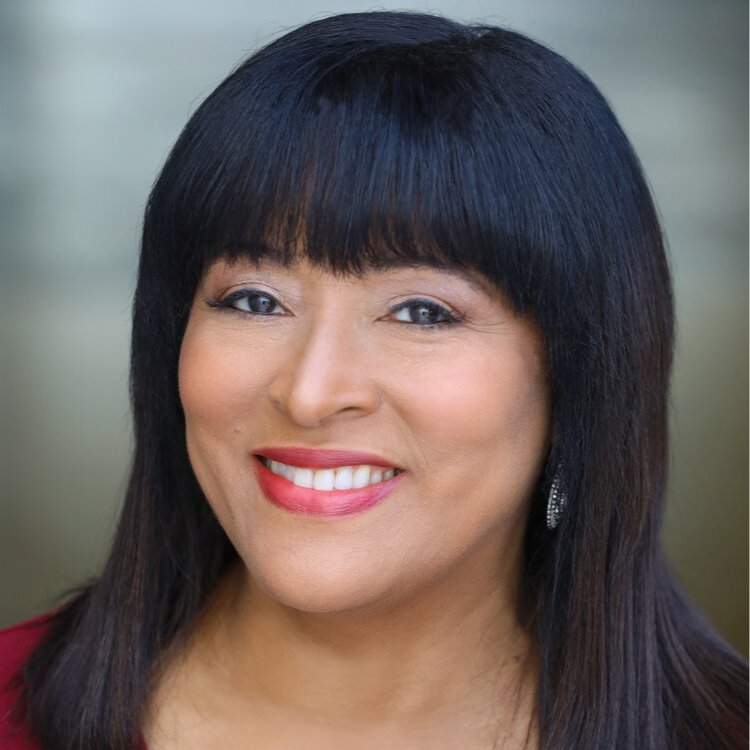Educación 2023
Miguel Cardona, U.S. Secretary of Education, visits a school in Puerto Rico, July 2021. Photo courtesy of the U.S. Department of Education
In a wide-ranging interview with palabra, Secretary of Education Miguel Cardona laid out his vision for the future of education, and his take on student debt relief and school safety
Haga clic aquí para leer este ensayo en español.
In 2021, Miguel Cardona became the 12th Secretary of Education of the United States.
Born in Connecticut to Puerto Rican parents, Cardona says his first language was Spanish, and that he was a first-generation college student.
Cardona began his career as a classroom teacher, and quickly moved up the career ladder. He eventually became commissioner of education for Connecticut and was later tapped for the nation's top education post by President Joe Biden.
The career educator is now the leading voice for a range of policies that affect 65 million students across the country, from preschoolers to adult learners.
Since taking office, the father of two has led the Biden administration’s response to a number of high profile issues, including a hotly debated student debt relief program and a seemingly unending spate of school violence.
Secretary Cardona recently granted palabra a one-on-one interview, presenting his vision for education and the needed action on pressing issues.
The questions and responses that follow have been edited for brevity and clarity.
palabra: The United States Supreme Court is expected to consider the legality of the Biden administration’s college student debt relief program. This program offers help to millions of borrowers who paid for their education with federally held loans. You have been quoted as saying that you believe the program is both lawful and necessary. Please explain.
Cardona: Student debt relief is something that is definitely needed for (borrowers) to continue their education, buy homes, start their small businesses. And in terms of legal authority, under the HEROES Act, very clearly I have legal authority to provide this waiver. It’s no different than the waiver that was done during the last administration to pause (loan) payments. I’m using the same authority that was used then, so there should be no issue. We’re looking forward to prevailing in the courts and providing 43 million Americans a little bit of respite as they get back on their feet after the pandemic.
palabra: Student debt affects people everywhere. But please elaborate on how the problem of student debt impacts the Latino community in particular.
Cardona: Let me first speak from my perspective as a first-generation college student, a Latino, (whose parents) came from Puerto Rico, so that (my siblings and I) could have a better life. Navigating college was pretty new and different, challenging, when I can’t ask a parent, how did you do this? How did you navigate FAFSA or what did you do for the admissions process? So that’s challenging enough and then to be brought into schools and the sticker price of some of these schools is extremely high. Being brought into programs and you’re not sure if there is good job placement after. These are all things that are concerning for students — Latino students who are first-generation college students.
So you put those factors together — the difficulty of navigating a new space (or) the fact that you don’t come from a lot of financial means — makes it that much more difficult. So when we put out an increase in (federal) Pell grants, or when we offer targeted debt relief...not only are we providing some respite for those students, we are also addressing some of the racial wealth gaps that we have in this country.
The research shows when we are successful, about half of the Latinos who have student loan debt will see their loan balances go to zero. Imagine the impact that has on the Latino community if in one shot, 50% of them have a zero balance. That means they could buy a home; they can move on with family planning; they can start a small business. It’s extremely impactful for the Latino community.
Secretary Cardona talks with children at a school in Hazard, Kentucky, January 2023. Photo courtesy of the U.S. Department of Education
palabra: Each day we hear about the so-called “COVID learning loss.” One study showed fourth and eighth-graders in most states experienced a decline in student math and reading (scores) in 2022. What can your department do to support these struggling students?
Cardona: The learning loss and missed instruction is significant…We took this very seriously. The president, through the American Rescue Plan, provided $130 billion for pre-kindergarten to Grade 12 schools. We’ve been pushing the dollars out right away, and we have been pushing states to provide after-school programs…better student-to-teacher ratios, tutoring for students who need it, (and) mental health support.
We’re visiting states where it’s working. We’re working with states that need help figuring out where to put those dollars to make sure that they are using (the money) to close achievement gaps.
Educators and educational leaders have really stepped up, using those dollars to help students in need. One of those areas is the mental health needs of our students. So in order to improve the academic output of students, we have to make sure they’re okay.
palabra: Tell us about your commitment to bilingual education.
Cardona: I grew up learning English second. I knew Spanish first, and I recognize that throughout much of schooling for so many kids, when they come in with a different language, it’s almost looked at as a negative — something that the systems are trying to erase so that they can learn English. Not only is that against what research shows is best for students, but it’s demoralizing for students.
What I want to do is ensure that we have bilingual education programs that honor their native language, that build on the skills in the native language and the culture, and that promote multilingualism as an asset.
I want to improve bilingual education by ensuring that it’s following research on what’s best (for teaching) English (to) students who know another language. But I also want to offer multiple pathways to language development. If we’re going to compete internationally and if we want our students to lead the world, providing them access to more languages will only help them.
palabra: School safety is a major concern. What can your department do to address this growing problem?
Cardona: The president really pushed after (the mass shooting in Uvalde, Texas) and members of Congress also stepped up to pass the bipartisan Safer Communities Act. Which means in essence, $2 billion for our schools to tighten up security plans, to provide support in the form of mental health counselors, social workers, psychologists and professional development for teachers, and making sure that the campuses are safer. We’re also fighting for safer gun legislation.
We’ve had more mass shootings than we’ve had days this year. We want our schools to be safe. As a parent, there is nothing more important to me than that. We’re doing our part. We have school safety plans. We at the Department of Education provide funds if there is a traumatic experience through Project Serve. We also have Project Prevent, which helps districts provide safer environments. It’s not just a school issue, it’s a community issue. It’s a national issue that’s spilling into our schools. So part of it is making sure we are having conversations with lawmakers to just continue the common sense legislation to keep the assault rifles away from our kids. That’s the bottom line.
When the president proposed that and passed that when he was in Congress, deaths like this were reduced tremendously. When the ban on assault weapons was lifted, (the number of shootings) went up again. We just have to have safer communities…our children shouldn’t be dying. We shouldn’t have shootings on college campuses. It’s out of control, and my fear is that we are normalizing this. So while we are doing a lot in the Department of Education, we are calling on our colleagues in Congress to really step up and be bold (and) act as if their children are in those same schools.
Secretary Cardona announces the “Raise the Bar: Lead the World” initiative at the U.S. Department of Education, January 24, 2023. Photo courtesy of the U.S. Department of Education
palabra: Tell us about your 2023 “Raise the Bar: Lead the World,” initiative.
Cardona: It’s basically our assertion that if we are going to be able to compete internationally, if we are going to be able to give our students the education that they deserve, we need to raise the bar in academics...Making sure that we also have good programs where kids can learn about financial literacy, learn how to balance a checkbook, learn about taxes, and have good STEM programs. We also want to make sure that we are providing good learning conditions, mental health support for students – not after the fact (but) when they need help, when they show signs of need.
We need to make sure we have a highly qualified workforce. We have to eliminate the teacher shortages by paying teachers a competitive salary. We’re failing there. We’re failing our students because we’re failing our teachers. So I’m calling to “raise the bar,” and make sure we address the teacher shortage by paying teachers a competitive salary. Then pathways to the careers that are coming (are important). The president spoke at the State of the Union about thousands and thousands of jobs that are coming to the United States. (These are) high skilled, high paying jobs that are going to require a pathway either from a high school to a two-year school, or from high school to the workforce.
So we have to create better career and college pathways in our schools, and pathways to multilingualism. Your brain functions better when you are multilingual, and our students have a better chance of success in life if they are multilingual. So we’re raising the bar at the Department of Education. We’re calling on all of our colleagues across the country to join us in raising the bar.
—
Saida Pagán is a Los Angeles-based broadcast and print journalist. She has received more than two dozen awards for her reporting including a team coverage Emmy and two Golden Mike Awards. Since 2021, Pagán has won three National Arts and Entertainment Journalism awards, three Southern California Journalism Awards and three awards from the National Association of Telecommunications Officers and Advisors. Pagán was born and raised in New York City and is of Puerto Rican heritage. She has worked as a reporter/anchor and print journalist for news organizations across the country. Pagán graduated from the City University of New York and holds a master’s degree with distinction in strategic communication from National University.





